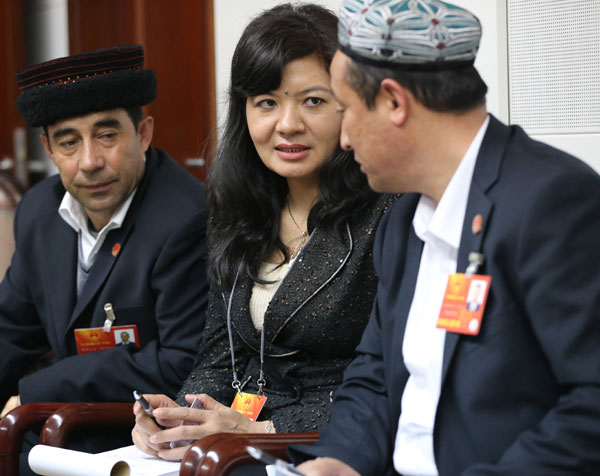Wearing translator's hat a big role
Sitting among three deputies wearing hats from three different ethnic groups, Nurgul Kerim scribbled on a notepad, and in a low voice translated every sentence into the Uygur language during a group discussion by the Xinjiang Uygur autonomous region delegation of the National People's Congress on Thursday morning.
The 42-year old has been the delegation's translator since 2003 and may have more experience of the NPC than some deputies in the delegation. This year, her job is to help five deputies from Xinjiang understand what other deputies are saying so they can air their points of view. A colleague working alongside her ensures all five deputies are taken care of.
"Language should not be a barrier for deputies to perform their duties," the 42-year-old said. Deputies who need her translation service are from the Uygur, Kazak and Tajik ethnic groups, each of which has its own language. She said the Kazak and Tajik languages share about 70 percent similarity with the Uygur language and all of those deputies speak the language fluently, so her service covers all the deputies.
 |
|
Nurgul Kerim (center) interprets during a panel discussion of the delegation of the Xinjiang Uygur autonomous region on Wednesday. JIANG DONG / CHINA DAILY |
Nurgul also has to help deputies translate their proposals into Chinese so they can be forwarded to responsible departments.
"Being a good interpreter for an NPC delegation is not easy. I need to be familiar with technical and political terms, especially new terms used in the annual work report, so I could translate them accurately," she said. Nurgul has to sit in every group session and she carries a copy of this year's work report in the Uygur language at all times.
Besides being a translator, she always comforts those who feel a bit nervous about coming to the session and don't know how to join the discussions.
"When they are ready for their speech, I inform other deputies and smile to them so they feel comfortable and talk with confidence. What I do is very important because I have to let their voices be heard and let them know others' responses accurately."
|
 |
Shen Wenfei, media officer from the Qinghai delegation, said they also prepared several translators, mainly for the convenience of journalists.
"Some deputies were so anxious that they could not express themselves well," Shen said.
Gyarong Nyima, a deputy from a village of Qamdo prefecture in eastern Tibet autonomous region, said although Mandarin listening is no problem for him, he has difficulties clearly expressing himself.
"The speech delivered at group discussions should be concise, clear and tightened. It helps me a lot to have a translator," Gyarong Nyima said.
Yong Ze, media officer from the Tibet delegation, said they did research before the delegation left for Beijing to see how many deputies are not good at speaking Mandarin and prepared two professional translators for them.
However, the translator for Gyarong Nyima was another deputy from Qamdo, named Abu, who is also the deputy Party secretary of Qamdo prefecture.
"I take pride in being a translator for a grassroots deputy and I feel the responsibility to do so. There are many dialects in Tibet, and the dialect in Qamdo differs a lot from the rest of Tibet. It might be difficult for people outside Qamdo to understand him, even though he can speak Tibetan, but it's a piece of cake for me," Abu said.
Ling Li, a woman from the Mongolian ethnic group, said she spontaneously translates the speeches at the plenary session to deputies through earphones.
The plenary session provides seven languages, including Tibetan and Korean, to deputies who have difficulties understanding Mandarin.
Contact the writers at [email protected]


